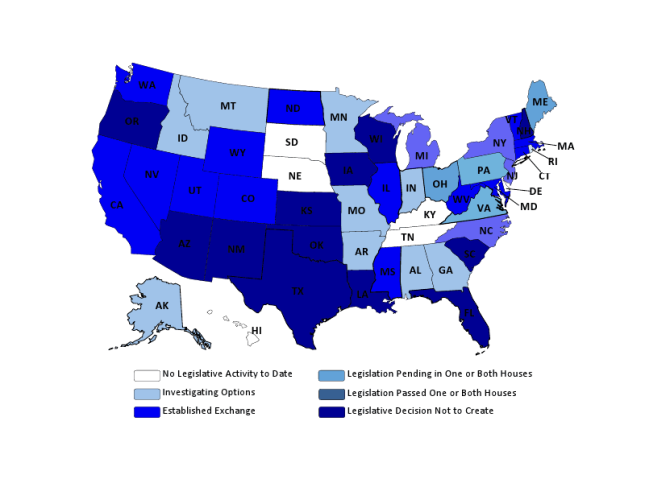With less than two years before state-based health insurance exchanges are to be operational, most state legislators and health policy experts still cannot come to an agreement on how to set up, operate, monitor or fund state exchanges. However, despite persistent confusion and concerns surrounding health insurance exchanges, the White House recently released a report on the progress of state-level health insurance exchanges. This publication took a favorable and possibly misleading view of the headway being made by states that are creating their online insurance marketplaces.
The Administration claimed that there are currently 28 states making great progress in establishing an exchange. Even if that were true, this indicates that 22 states -or about 40 percent- are refusing to comply with the Patient Protection and Affordable Care Act (PPACA).
Although the report does not lie, it also doesn’t exactly accurately portray where most states stand either… The Administration chose to furtively count states that fall into a grey area as making progress toward setting up an exchange. Many states have, in actuality, refrained from any legislative activity or the state legislature has merely set up a committee to “study options”. What this really indicates is that many states are purposefully not complying with the PPACA mandate to create an exchange, but also managing not to violate it so that they are allowed to keep federal funding, at least until the January 2014 deadline.
Figure 1 below illustrates exchange status more accurately by categorizing, into six categories, where states stand in terms of state-based exchange implementation. These classifications range from states that have already established an exchange to states who have taken legislative action not to create an exchange.
As the White House rightly exhibited, there are a few states that have made significant progress in setting up an exchange and benefited greatly from the extra federal dollars. Rhode Island recently received an additional $60 million from the federal government for their collaboration with Massachusetts and Vermont to improve system integration associated with health insurance exchanges. California, Colorado and Washington have also seen legislation signed into law following the passage of PPACA to implement a state health insurance exchange.
In contrast, based on a February 2012 analysis of all states, Figure 1 shows that five states have no legislative activity whatsoever related to a health care exchange; and several states such as Wisconsin, Louisiana and Florida not only rejected setting up an exchange, but returned the grant money bestowed to them from the federal government to establish an exchange. More common scenarios, and where Figure 1 differs from the White House, are that many states are merely “investigating options” or allowing an exchange bill to bounce around legislative committees but never go to a vote. These alternatives allow states to keep their federal funding, but take no action set up an exchange.
For example, the state of North Carolina had a Republican majority who drafted an exchange bill. That bill, however, was moved from one committee to another over than span of months for “reading.” For the past year, that same bill hasn’t seen the light of day and the Republican majority has no intention of ever letting it. This way, the state is allowed to spend federal exchange dollars, but not actually carry out the Administration’s plans. New Hampshire also had an exchange bill written, but after passing the Senate, that bill failed to pass the House of Representatives. In doing so, New Hampshire was allowed to keep exchange funding, but use the stalemate as a way of not having to revisit the idea of exchange implementation until a future session. South Carolina on the other hand used the original Exchange Planning Grant from the federal government to create an exploratory committee on exchanges, but decided after its creation that no legislation should be written.
As the economic crisis continues, unemployment remains high and the Supreme Court prepares to hear oral arguments for various provisions of PPACA in March, the number of states moving forward with enacting an exchange should become stagnant. This could further undermine the “progress” being made by states that fall into the grey area. Regardless, whether states are stalling efforts to create state-level exchanges, “studying” alternative options and costs, or flat out rejecting the idea, it’s safe to say that the optimism demonstrated in the White House report is a bit rosier than the real state of state-level health insurance exchanges.
This post is written by new Wright on Health blogging partner Nicole Fisher. Nicole is the Senior Policy Director at Health Systems Innovation Network where she does health economic and policy analyses generally focusing on Medicare, Medicaid and health reform. She also is a current PhD student at the University of North Carolina in the Health Policy and Management Department and writes on a variety of health care topics for several think tanks and websites. Nicole also has a masters degree in Public Policy from the University of Chicago and an undergraduate degree from the University of Missouri.







